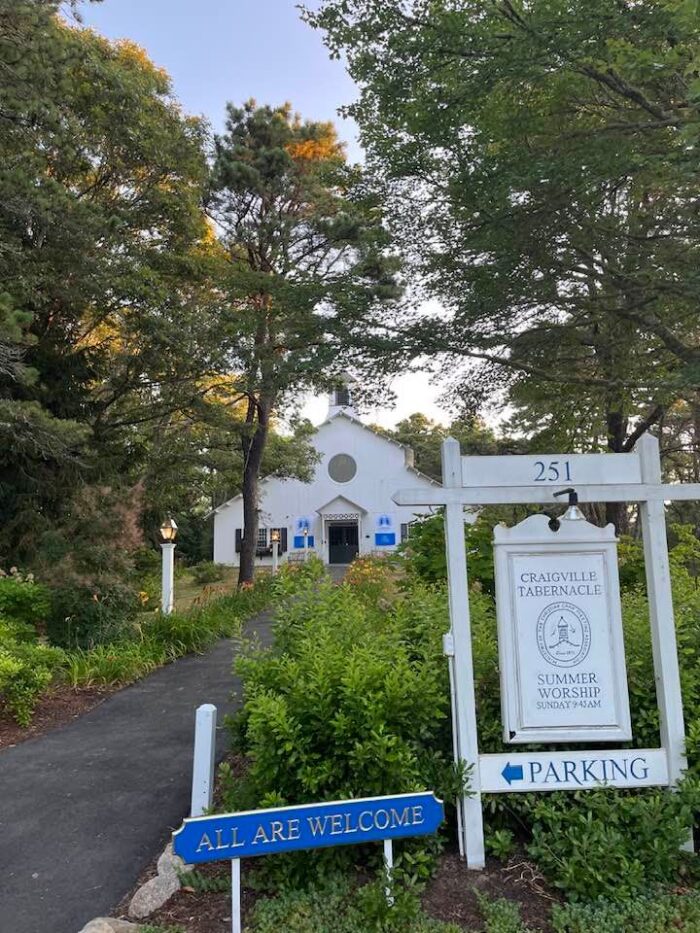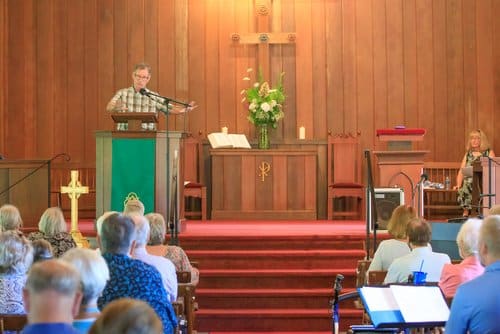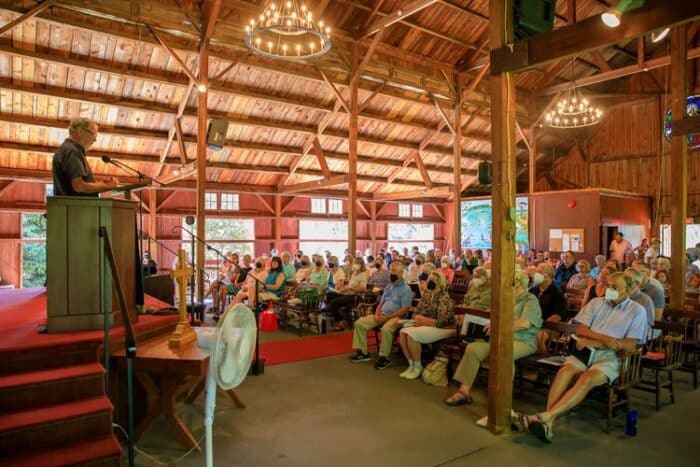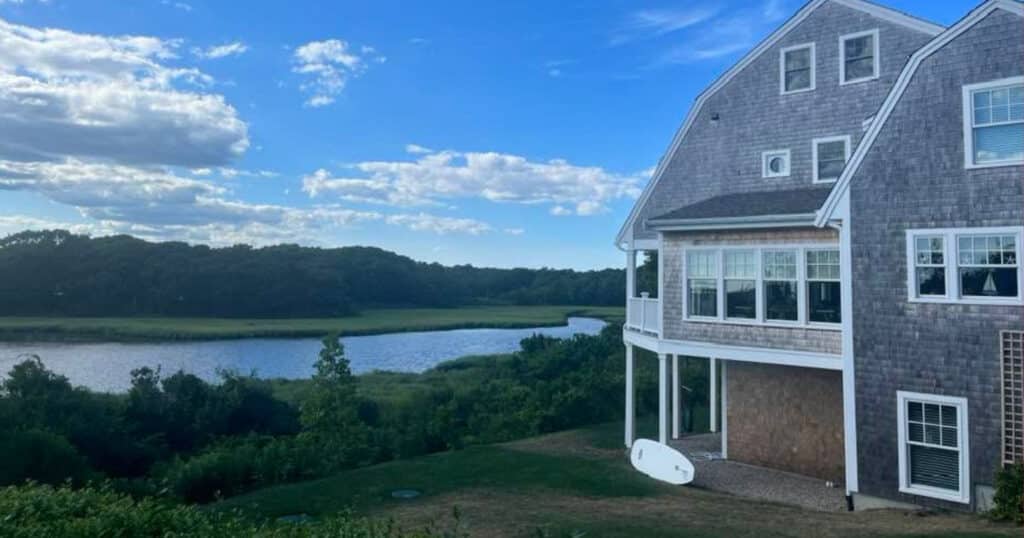At 150, Cape Cod village recalls its ‘progressive, prophetic’ UCC roots
An unusual Massachusetts village with deep United Church of Christ connections just turned 150.
Craigville, on Cape Cod, started in 1872 as a tent site for religious camp meetings. It soon became a village of summer homes. Over the decades, it’s been a retreat site for people of many denominations, a resting place for mission workers, and home to many events.

Since 1984, for example, the annual Craigville Theological Colloquy — with UCC roots, but ecumenical in nature — has attracted “pastors, teachers, seminarians and lay leaders for a week of theological conversation and Bible reflection on a subject of importance.”
The village was also the site of a formative event in UCC history. That moment came in August 1897, in the cottage of the Rev. Martyn Summerbell.
There, Congregationalists met with counterparts from the Convention of the Christian Church, also known as the “Christian Connection.” They wrote the “Craigville Recommendations” for a union between the two bodies.
As noted in Volume 6 of The Living Theological Heritage of the United Church of Christ, that union took a while. But in 1931, the Congregational Christian Churches were in fact formed. And that body, in turn, became part of the UCC in 1957.
The village today
Summerbell’s cottage still stands. It was a stop on a Craigville home tour, part of two weeks of events in July and August celebrating the 150th anniversary.
Situated near Centerville in the Town of Barnstable, the village is governed by the Christian Camp Meeting Association, which dates back to that first 1872 tent gathering. Today it has 115 homes, the Craigville Retreat Center, the Craigville Tabernacle (built in 1885), a gift shop, a beach on Nantucket Sound, ponds, a creek and an estuary.
There is also a Craigville Cottage Owners Association and a Craigville Beach Association. For several decades, the UCC’s Massachusetts Conference, now part of the Southern New England Conference, had a lease arrangement with Craigville and operated the retreat center — a relationship that ended within the last decade.

In celebrating their anniversary, villagers took a deep look at their past and pondered their future. General Minister and President John Dorhauer of the UCC — the denominational heir of the Christian Connection movement — preached in the Tabernacle on “Big Sunday,” July 31, the central day of the celebration. “Heritage Series” lectures addressed topics ranging from the culture of the Wampanoag people who have inhabited the land for some 10,000 years, to a survey of residents of all ages about Craigville’s future.
‘Basic, radical’ principles
In one of those lectures, “Modern Craigville: The Founders,” two UCC scholars touched on the religious views of the people who started Craigville and how they might be relevant today.
Church history scholar Elizabeth Nordbeck said Craigville’s founders were part of a movement “that was remarkably progressive, prophetic and in some ways thoroughly modern long, long before its time.” Formed in 1793, it emerged during years of rapid societal change, not unlike today’s.
“They saw their movement as just that — a movement, not a structure or an institution, and certainly not a denomination,” said Nordbeck, a past professor and dean at Andover Newton Theological School and Lancaster Theological Seminary. But “reality eventually intervened,” she said, and “more structure and formal discipline were needed.” Nonetheless, the Christians — they preferred that simple name — never abandoned principles that Nordbeck said are the hallmarks of their legacy. They:
- Were “ecumenists before ecumenism was a word.” They believed “separation and division are themselves profoundly unchristian.”
- Supported women’s ministries at a time when almost no one else did.
- “Believed in the fundamental equality of all believers” — a “basic and radical principle.”
- Espoused “a faith that was, for its time, remarkably broad and open, not narrow and constrained. God’s churches, they felt, and church members, should always welcome diverse theological perspectives.”
‘More pluralistic organization’
Sociologist of religion Bill McKinney, past president of Pacific School of Religion and dean of Hartford Seminary, is a Craigville resident and current president of CCMA. He described how Craigville’s programs have waxed and waned over the decades since that first camp meeting.
“At its peak, it was attracting over 10,000 participants a year, for Conference retreats, choir and bus camps, local church youth and adult retreats throughout the year — and later, widely used by schools and colleges.”
In recent years, it has embraced an ecumenism that its founders might recognize. “I think it’s fair to say we’ve made a successful transition from being an old-line Protestant center to becoming a much more pluralistic organization,” McKinney said.
“The Diocese of Fall River over the years has moved over 10,000 Roman Catholic youth through confirmation retreats. We have Jewish and pagan and Buddhist users.” He described Craigville’s ethos as that of “a religion-friendly private nonprofit.” “Now, in a typical year, we host groups ranging from Brazilian Pentecostals to large Korean churches to mushroom pickers.”
‘Outsider role’
McKinney described challenges the village now faces, ranging from climate change to the ability of future generations to afford property there. “Up to now, sometimes in fits and starts, Craigville has shown the capacity to adapt and to build, and I hope it will continue to do so.”

Religious roots are among its strengths, he said.
“Do we need to consider and to claim an ‘outsider’ tradition?” he asked. “There’s something different about religion here at Craigville than religion in our home communities. I think we know that. I think we haven’t articulated it. Outdoor ministry has a subversive side, and it serves as a corrective to overly formalized and bureaucratic expressions of the religious life.”
“I hope we’ll always take seriously that Craigville is a place of positive, life-changing experiences,” he said. ” … We need to tell stories of that impact. … An outsider role. A place that changes lives. I think the founders of Craigville would have appreciated that about Craigville today.”
Content on ucc.org is copyrighted by the National Setting of the United Church of Christ and may be only shared according to the guidelines outlined here.
Related News
A Prophetic Call for Justice and Peace in Palestine
The executive leaders of the United Church of Christ have issued the following statement...
Read More‘Love is Greater Than Fear’: Regional Youth Events get to the heart of gospel message
United Church of Christ teens attending this summer’s Regional Youth Events (RYE) are...
Read MoreUCC desk calendars available to order now
Prepare for your day, month and year with the United Church of Christ desk calendar —...
Read More


